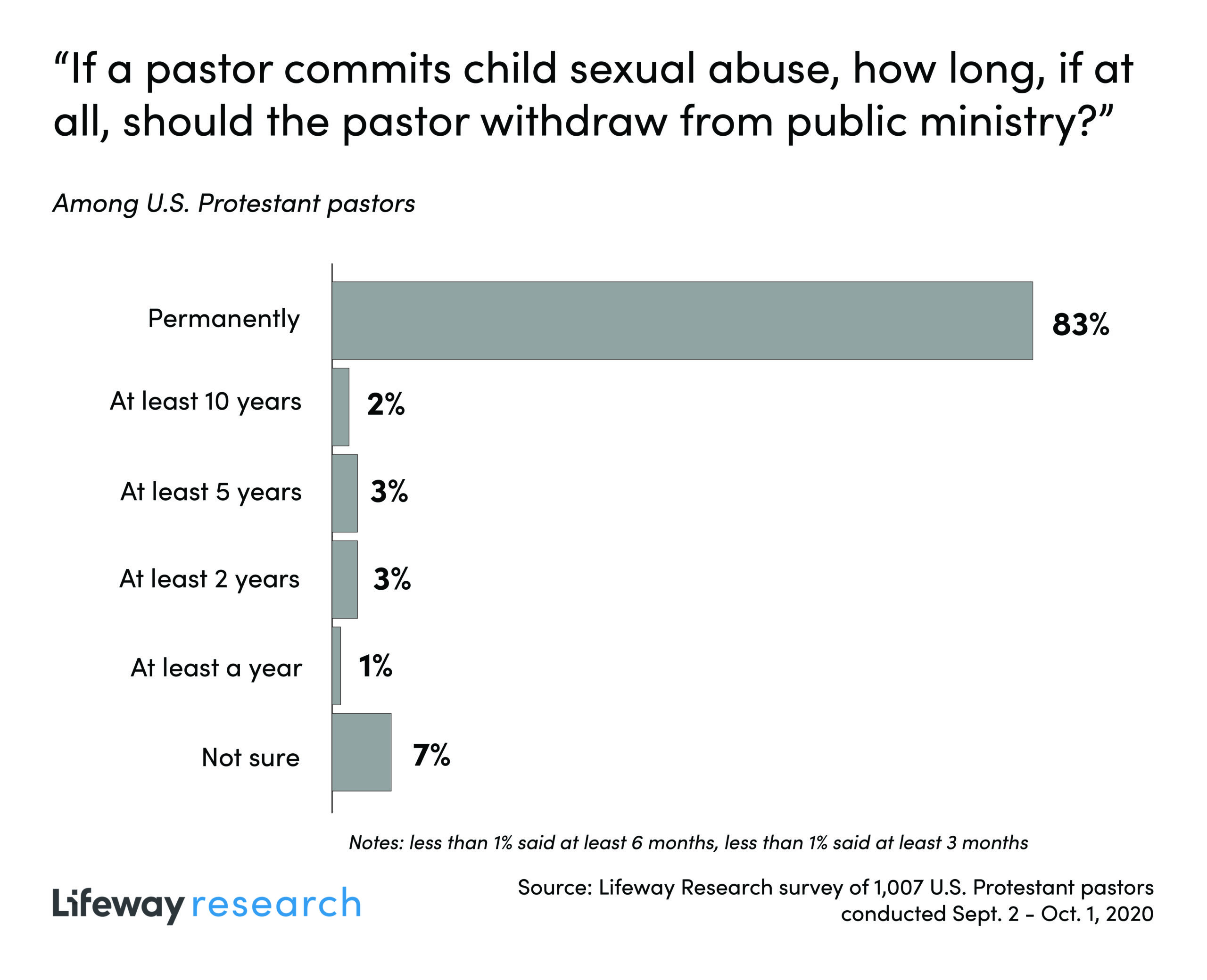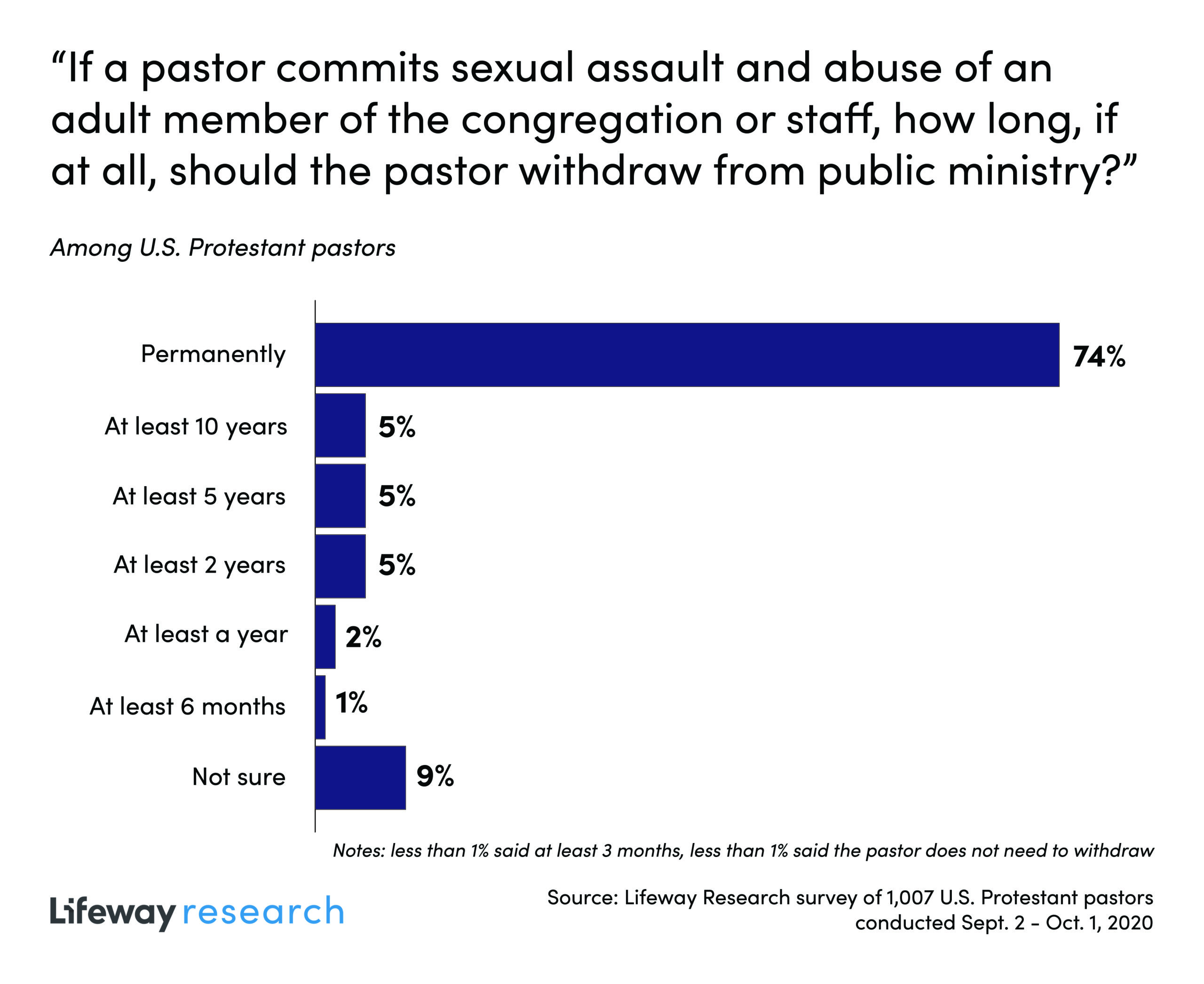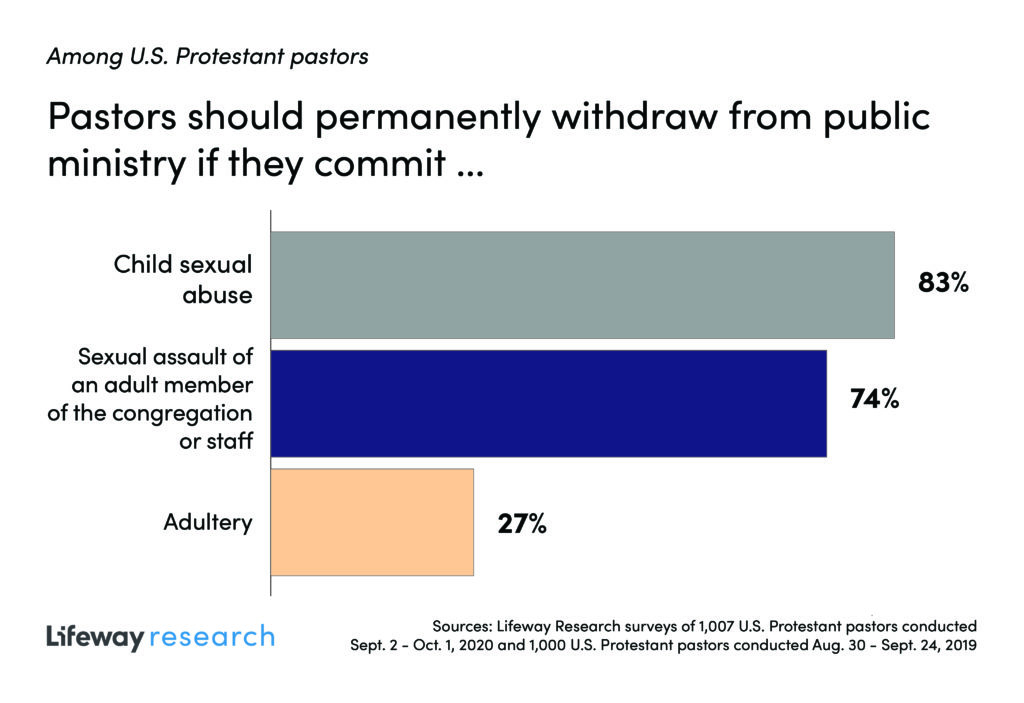
A majority of U.S. Protestant pastors say a minister who commits sexual abuse or sexual assault should withdraw permanently from ministry.
By Aaron Earls
As Christian groups and denominations debate the proper response to clergy sexual misconduct (both child sexual abuse and adult sexual assault), most pastors believe those who commit such crimes should withdraw from public ministry permanently.
At the recent Southern Baptist Convention annual meeting, the topic of pastoral sexual abuse and assault dominated much of the conversation and business, including passing a resolution that “any person who has committed sexual abuse is permanently disqualified from holding the office of pastor.”
A study from Nashville-based Lifeway Research revealed a significant majority of U.S. Protestant pastors share that opinion whether the victim is a child or an adult.
“Most current pastors believe the office of pastor is incompatible with having sexually abused or assaulted another,” said Scott McConnell, executive director of Lifeway Research. “This does not convey that they believe these behaviors are beyond God’s forgiveness, but a large majority believe sexual abuse is a permanent disqualification from ministry leadership.”
Child sexual abuse
More than 4 in 5 Protestant pastors (83%) say if a pastor commits child sexual abuse, that person should permanently withdraw from public ministry. For 2% the time away should be at least 10 years, while 3% say at least five years and 3% say at least two years.
More than 4 in 5 U.S. Protestant pastors (83%) say if a pastor commits child sexual abuse, that person should permanently withdraw from public ministry, according to Lifeway Research. Click To TweetFew point to a shorter time frame as appropriate—1% say at least 1 year, and fewer than 1% say either six months or three months. Another 7% say they aren’t sure how long the time frame should be.

While majorities of every demographic group of pastors support a permanent exit from public ministry for child sexual abuse, some are less supportive than others. Pentecostal pastors (60%), African American pastors (67%), pastors with no college degree (69%), and pastors 65 and older (76%) are among those least likely to support permanent withdrawal.
The U.S. Sentencing Commission reported that 98.8% of sexual abuse offenders were sentenced to prison and their average sentence was almost 16 years.
“The five years or less time frame, that 7% of pastors suggest is appropriate, does not even cover the length of the typical prison sentence for offenders convicted of sexual abuse,” said McConnell. “In contrast, more than 10 times that number of pastors do not hesitate to say the disqualification from ministry should be permanent for a pastor who commits child sexual abuse.”
Adult sexual assault
A sizable majority of Protestant pastors (74%) also supports a permanent withdrawal from public ministry for any pastors who commit sexual assault and abuse of any adult member of the congregation or staff. One in 20 say the time away should be at least 10 years (5%), at least five years (5%), and at least two years (5%).
74% of U.S. Protestant pastors support a permanent withdrawal from public ministry for any pastors who commit sexual assault and abuse of any adult member of the congregation or staff, according to Lifeway Research. Click To TweetAgain, few pastors back shorter time frames, with 2% saying at least a year, 1% at least six months, and fewer than 1% at least three months. Fewer than 1% say the pastor does not need to withdraw at all. Almost 1 in 10 (9%) say they’re not sure.

Pentecostal pastors (44%) are the only demographic in which a majority do not support permanent withdrawal from public ministry for pastors who commit sexual assault of adults under their care and supervision in church. Other demographics are also less supportive of the pastor stepping away permanently, including African American pastors (58%), pastors without a college degree (63%), and pastors 65 and older (69%).
“When someone sexually assaults an adult, it is both a violent sin and a crime. It is the opposite of the love, care and respect toward another the Bible teaches,” said McConnell. “The role of pastor has incredibly high standards in the Bible, including that the overseer of those in the church be above reproach or beyond criticism. Seventeen percent of pastors think someone could move beyond reproach in this matter given enough time.”
A 2019 Lifeway Research study found many Protestant churchgoers believe there are additional undisclosed instances of Protestant pastors sexually abusing children or teens (32%) or sexually assaulting adults (29%). In that same study, 3 in 4 churchgoers (75%) say they want a careful investigation of the facts if someone accused a pastor at their church of sexual misconduct. Few (14%) say their reaction would be to want to see the minister protected.
Adultery vs. assault
Clear majorities say pastors who commit child sexual abuse or sexual assault should withdraw permanently from ministry, but only 27% believe that should be the result of a pastor committing adultery. Click To TweetCompared to their perspective on abuse, pastors are much more divided over the proper response to adultery, according to an additional 2019 Lifeway Research study. While clear majorities say pastors who commit child sexual abuse or sexual assault should withdraw permanently from ministry, only 27% believe that should be the result of a pastor committing adultery. A plurality (31%) is not sure.

“While adultery implies a consensual affair, it is not such a simple distinction for those serving in the role of pastor, as indicated by the 31% who were not sure in the previous survey,” said McConnell. “For a pastor who holds a position of trust and spiritual authority over those in their congregation, an adulterous relationship with one of them, where an imbalance of power exists, would still constitute sexual assault.”

For more information, view the complete report.
Methodology
The mixed mode survey of 1,007 Protestant pastors was conducted Sept. 2 – Oct. 1, 2020 using both phone and online interviews. Phone: The calling list was a stratified random sample, drawn from a list of all Protestant churches. Quotas were used for church size. Online: Invitations were emailed to the Lifeway Research Pastor Panel followed by three reminders. This probability sample of Protestant churches was created by phone recruiting by Lifeway Research using random samples selected from all Protestant churches. Pastors who agree to be contacted by email for future surveys make up this Lifeway Research Pastor Panel.











